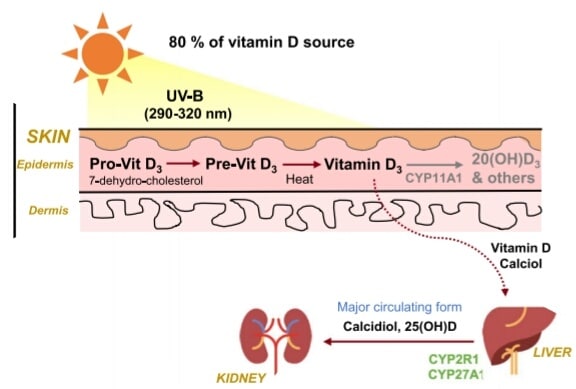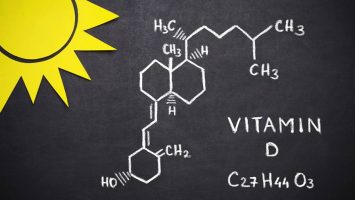Vitamin D
Vitamin D plays a significant role in our health, and a growing body of research on vitamin D underscores the importance of healthy vitamin D levels. Some of the latest scientific studies on vitamin D, published on PubMed, look like this:
The Putative Role of Thyroid Hormones and Vitamin D on Severity and Quality of Life in Psoriasis.
Effect of Vitamin D Status during Pregnancy on Infant Neurodevelopment: The ECLIPSES Study.
See here all Vitamin D publications on Pubmed
The winter blues
Who hasn't experienced the winter blues? The days are getting shorter, there's less sunlight, and our thoughts are becoming less sunny. A shorter day and less intense sunshine mean that in the Netherlands, we can't produce vitamin D from sunlight between November and April. During this period, vitamin D levels drop and are only replenished sparingly through food. Even people who lose weight slowly in the winter, which is normal in nature due to food shortages, release vitamin D stored in fat. Therefore, there's a very high risk of developing a vitamin D deficiency during the colder months these days. People with dark skin and those who spend a lot of time indoors are even more likely to develop a deficiency of the sunshine vitamin.
Low vitamin D and depression
Besides the gloomy thoughts caused by bad weather, a vitamin D deficiency plays a major role in despondency. Simply put, vitamin D strengthens the immune system, making us more susceptible to illnesses and the inflammatory responses that come with them. Inflammatory substances prevent the release of serotonin, and a deficiency alters thought patterns into something you might call depressive. Vitamin D can therefore (partly) play a role in depression.
Weaker immune system
Besides depression, a weakened immune system can also give free rein to other (existing) conditions. Consider, for example, psoriasis and MS. The brain, muscles, heart, pancreas, thyroid, parathyroid, thymus, skin, intestines, ovaries, uterus, placenta, breast, and prostate all require vitamin D to function properly. Many conditions affecting these organs can be related to low vitamin D levels. Autoimmune diseases, bone disorders, chronic pain, intestinal disorders, type 2 diabetes, cardiovascular disease, infectious diseases, cancer, and PMS can all occur (partly) due to a chronic vitamin D deficiency. Even the risk of fatal infection from COVID-19 and other viruses can be reduced by preventing a vitamin D deficiency. This is likely one reason why viruses like the flu are more common during the winter.
Increase vitamin D
UV light
UV-B radiation from sunlight or tanning beds provides the most vitamin D. UV radiation has both positive and negative properties, so it's wise to avoid too much, but certainly not too little, exposure to UV light. During the winter months, moderate tanning is more of an advantage than a disadvantage, but don't overdo it by choosing the strongest tanning bed and the longest duration. When the sun is strong enough, during the period from May to October in the Netherlands, fifteen to thirty minutes in the sun is often enough to provide your daily dose of vitamin D.

Power supply
Although it's difficult to get enough vitamin D through diet, every little bit can help. Oily fish and mushrooms exposed to UV light contain relatively high concentrations of vitamin D. Very low concentrations of vitamin D are found in eggs, meat, and other animal products.

Supplements
The easiest way to get enough vitamin D during the dark days is to buy a vitamin D supplement. The recommended daily dose is between 10 and 20 micrograms (400-800 IU). Many supplements have higher doses than the recommended daily dose. The maximum recommended daily dose is 100 micrograms (4000 IU). So, 25 micrograms (1000 IU) per day is more than sufficient during the dark days.
